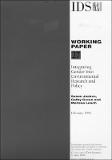| dc.description.abstract | Many interventions in the environment sector have given women a role in
environmental projects in the hope that this would facilitate resource conservation
efforts as well as benefiting women themselves. But across a whole range of subsectors
(forestry, soil conservation, water, rangeland management, integrated pest
management etc.), outcomes have often been disappointing and sometimes even
damaging to women:
• women have often been treated as, in effect, a source of cheap labour, with little
consideration as to whether the project really served their interests. Frequently the
demands of a project merely added to women's already overextended workload, or
required them to forsake some other activity.
• in cases where women were able to resist the attempt to commandeer their labour,
projects often failed as a result.
• women have usually been sidelined in the management o f projects, once they come
on stream, and rarely given any decision making powers (even where the project
relates directly to women's social responsibilities), or responsibilities for high-level
tasks in routine operations.
The approach underlying past efforts to incorporate women into projects relied on a
flawed conceptualisation of gender relations, hingeing on the idea that men and women
assumed gender roles that were unproblematically complementary to each other. This
led policymakers to focus exclusively on women's subsistence roles, ignoring their
market-related activities and the dynamic interactions of men's and women's resource
management roles and responsibilities; and to view women as an untapped pool of
labour whose energies could be costlessly mobilised for project activities, while in
reality women's workload usually entailed diversion of effort to the project and carried
an opportunity cost to them. It also tended to be assumed that participation in an
environmental project would benefit women, without appreciating either that women
might have no rights in the incremental resource so created, or that women's
involvement with resource management might be a residual consequence of lack of
access to more rewarding activities.
Recent research in many different settings has arrived at a new understanding of the
links between gender relations and environmental management which carries very
different policy implications. The prime requirement is the understanding that men's
and women's interests in and incentives for environmental conservation may be very
different, largely because women have lesser property rights than men in environmental
resources. Those rights are usually insecure, being embedded within and contingent on
the rights of male kin; and, slight as they may be, they risk being undermined by
interventions of any kind.
women's property rights in natural resources need to be identified at the outset and
actively monitored throughout the life of a project.
policymakers need to examine, support and build on the often little visible
institutional arrangements and networks which provide channels for women to press
their concerns and guard their entitlements in situations of ecological stress or
environmental change.
women must not be expected to participate in or contribute to the furtherance of
resource use practices from which they themselves will not benefit. They must, at
the least, be paid for any current labour contribution to a project on the same terms
as men.
local project management procedures must be designed to give real representation to
women's interests.
the need to widen people's, particularly women's, range of livelihood choices may
sometimes imply a need for interventions not focused on the environment per se.
where any charges are involved, policies need to take account of the fact that 1)
women have lesser command over cash than men and that 2) where men control
household expenditures, they may not give proper weight to women's interests or
priorities. | en_GB |

